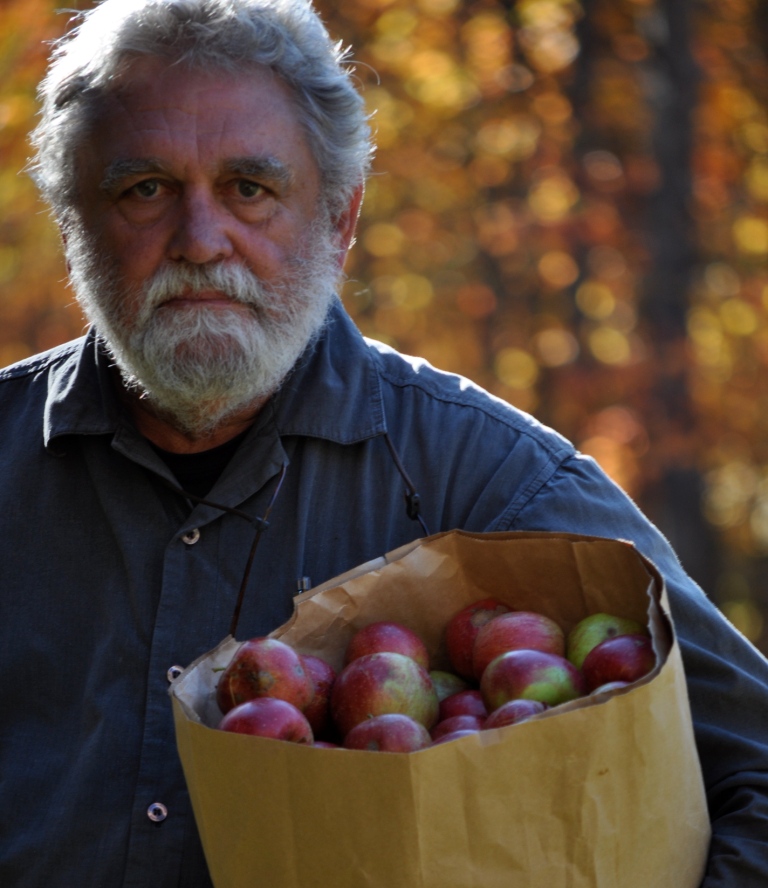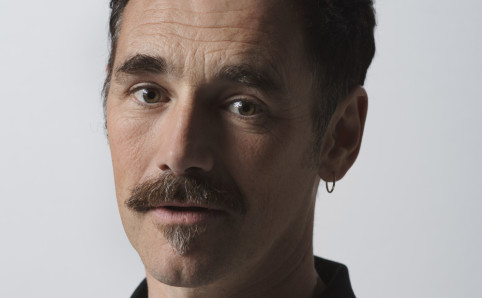Casting ‘Nice Fish’
In the second installment of her Interview in Two Acts, Connie Wanek chats with Duluth-based poet-turned-playwright Louis Jenkins and actor/director Mark Rylance about the casting process of 'Nice Fish,' set to open at the Guthrie in April.



PREVIOUSLY…
In Act One of our interview with poet–and now playwright–Louis Jenkins, we discussed the genesis of the play, Nice Fish, which he co-wrote with Mark Rylance, the Tony Award-winning actor and director. We picked up our conversation in January 2013, this time focusing on the casting of the play, much of which took place in Minneapolis in October. On February 4, the complete cast was announced. Rehearsals began the first week in March. The following is an excerpt from the Guthrie Theater’s fact sheet:
Nice Fish
by Mark Rylance and Louis Jenkins, dedicated to Nataasha van Kampen and James Hillman; based on the poetry of Louis Jenkins, directed by Mark Rylance and Claire van Kampen
The lauded and inventive Mark Rylance appears as part of the cast in the story of two men ice fishing on a frozen Minnesota lake on a late-winter day who encounter mythic and seeming immortal beings. With dialogue based on the prose poems of Louis Jenkins, Nice Fish melds the eternal and the poetic with humor and winking mystery.
Company: Chris Carlson (Wayne/), Bob Davis (DNR Officer), Tyson Forbes (Wainwright), Jim Lichtscheidl (Eric), Mark Rylance (Ron) and Emily Swallow (Flo).
Creative Team: Mark Rylance and Claire van Kampen (Director), Todd Rosenthal (Set Designer), Ilona Somogyi (Costume Designer), Mimi Sherin (Lighting Designer), Scott W. Edwards (Sound Designer), Michael Lupu (Dramaturg), Tree O’Halloran (Stage Manager) and Jon Ferguson (Assistant Director).
Performance Dates: April 6, 2013 – May 18, 2013
***************************
Connie Wanek: Would you describe the casting process for Nice Fish? We picture something out of the movies: i.e. director and writer seated in a dark theater, actors venturing cautiously onto the lit stage, and after a moment or two, the director calls out, “Next!”
Louis Jenkins: The auditions took place in a large, well-lighted room and was more casual. Mark [Rylance] and Claire [van Kempen, the directors] already knew many of the actors from the time of [Robert Bly’s 2007 adaptation of] Peer Gynt. The actors were called into the room one at a time — that is, they were invited rather than summoned. There was no calling “Next!”
Connie Wanek: Who was involved in the casting process?
Louis Jenkins: Mark was there, of course, and his wife Claire Van Kampen who is assistant director; Joe Dowling, the Guthrie’s Artistic Director; John Miller-Stephany, Associate Artistic Director; Casting Director Pat McCorkle; and Jennifer Liestman, Artistic Administrator. There was also a young actor named John Skelley who helped out with the audition playing various parts when there was a dialogue. I guess he’s known as “Reader.” He was very good.
Connie Wanek: How many days did it take to cast the play?
Louis Jenkins: It took the better part of a week in Minneapolis. The actors had memorized bits of the script that Mark had chosen. For their auditions, they had the choice of several different scenes; some of them chose to do all the scenes. Some of the actors who seemed right for the parts were asked to return for a follow up later in the week.
_____________________________________________________
As all this has unfolded, it’s become clear to me just how many people one interacts with to take a work to the stage, how important they all are to the success of a play. Poetry, as you know, is a very solitary activity, and almost no one applauds.
_____________________________________________________
Connie Wanek: How many actors tried out for each role?
Louis Jenkins: It depended on the role. A lot of actors tried out for the one female part. But then there is a small part that requires the actor to ice skate and play the Hardanger fiddle. Only two auditioned for that part. I can’t remember how many actors there were in all. Mark and Claire and Pat auditioned more actors in New York City the following week. But all members chosen for the cast are actors who have previously performed at the Guthrie.
Connie Wanek: Any temptation to add characters so as not to turn away a particular actor?
Louis Jenkins: It was very difficult to have to turn any of the people away. Everyone who tried out was very good. Some did not seem quite right for a particular part, but all were very talented and professional. Of course, it’s Mark’s job, as director, to make the final decision and to inform the actors.
Connie Wanek: What about Mr. Rylance? Can you describe his approach to the actors, as an actor himself?
Louis Jenkins: He is very good working with actors, very relaxed, and he made, I thought, the actors feel at ease. And he was good, even in that short time, at coaxing out of them something of the character he had in mind.
Connie Wanek: Did you form any impressions about the life of an actor, as opposed to, say, the life of a poet, or the life of a cardiologist, for that matter?
Louis Jenkins: I think that a life as a doctor may be closer, actually, because actors and doctors are much more involved with other people [than are poets]. I really got a sense of just how many people one interacts with, working in the theater, and how important they all are to the success of the play. Poetry, as you know, is a very solitary activity, and almost no one applauds.
Connie Wanek: Did it make you want to get up there on stage and try your luck?
Louis Jenkins: No. I’m a terrible actor, as I’m sure Mark and Claire will tell you. I was asked to say a couple of lines during the auditions, not “say” really, but read, and both times I screwed them up. About five words, can you believe it? I came in at the wrong moment. Bad timing. I once had a girlfriend who mentioned that to me.
Connie Wanek: What else did you do during the casting effort?
Louis Jenkins: Claire and Mark and I spent part of a day talking with Todd Rosenthal who is designing the set. I’ve seen some of the mock-ups and I think the design is brilliant.
Connie Wanek: You mention a fiddle…there will be music?
Louis Jenkins: Yes. That’s Claire’s department. She has done music for lots of film and theater.
Connie Wanek: What are the Guthrie theater personnel like behind the scenes?
Louis Jenkins: Everyone has been very helpful and friendly. Made me feel almost as if I knew what I was doing there.
Connie Wanek: How do you think the play will change during rehearsals, if at all?
Louis Jenkins: I’m sure it will change, but I have no idea how. A lot of factors are involved, the actors’ interpretations, the practical limitations of the theater… This is new to me and I’m very much looking forward to watching it all unfold.
Connie Wanek: What’s the next step for you?
Louis Jenkins: Rehearsals start soon, and I plan to be around for as much of that as I can. This play is something that doesn’t happen everyday, especially to a poet. Otherwise, I’m trying to put together a new book of poems.
Connie Wanek: That’s wonderful news! Do you have a title? When can we look for the book? What can you tell me about it?
Louis Jenkins: It’s called Tin Flag: New and Old Prose Poems. I hope the book will be out in April or May. It’s a book of prose poems, very like the stuff I’ve been writing for 40 years. It would be fun to say, “I’ve just completed a book of love sonnets,” but I haven’t.
And two quick questions for Mr. Rylance:
Connie Wanek: I’m sure we agree that Louis has a marvelous aspect for the stage. Is he as bad at acting as he claims, or could you make an actor of him?
Mark Rylance: Louis is too good a person for me to make him into an actor.
Connie Wanek: Rehearsals will begin in early March. There’s plenty of winter left in Minnesota, plenty of time to get the entire cast out on the ice for some genuine ice fishing. Any plans to do that?
Mark Rylance: Yes, we will certainly be ice fishing if possible.
_____________________________________________________
Related links:
The world premiere of Nice Fish, co-written by Mark Rylance and Louis Jenkins, runs from April 6 through May 18 at the Guthrie Theater in Minneapolis; after several preview performances, the official opening night will be Friday, April 12 at 7:30 pm. For more information: http://www.guthrietheater.org/plays_events/plays/nice_fish
_____________________________________________________
About the author: Connie Wanek is the author, most recently, of On Speaking Terms (Copper Canyon Press, 2010), which was a 2011 nominee for the Minnesota Book Award for Poetry. Her work has appeared in Poetry, Atlantic Monthly, Virginia Quarterly Review, Narrative, Poetry East, and many other publications and anthologies. She has been awarded several prizes, including the Jane Kenyon Poetry Prize and the Willow Poetry Prize, and she was named the 2009 George Morrison Artist of the Year. Poet Laureate Ted Kooser named her a 2006 Witter Bynner Fellow of the Library of Congress. Her poem, “Polygamy,” was the grand prize winner in the last iteration of mnartists.org’s What Light competition.